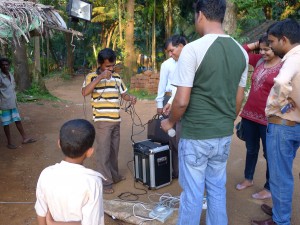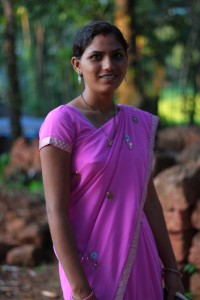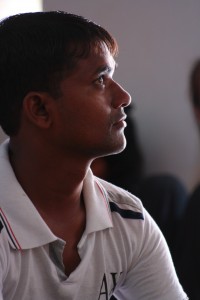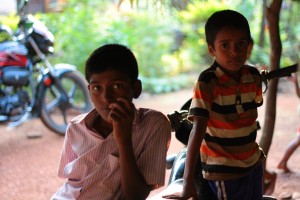 “Some of the places we work in are not even marked on the maps,” says Jeetu Makwana, former manual diamond polisher turned firebrand dalit activist and community video producer. Along with his wife Niru and colleague Girish and a few others, he has been working relentlessly for the past 5 years to organize people’s movements at the grassroots across the hinterlands of Gujarat in Saurashtra district. In the region, the majority lower castes have been living under the tyranny of the minority upper caste for all of recorded history. “The discrimination and oppression have changed the ways they manifest themselves, so some people mistakenly believed that the problems had been taking care of,” says Girish,” but every decade or so the truth is concealed a newer mask, each looking more benign than the previous.” When the three of them speak out, they are speaking for 665 villages in some of the most undeveloped regions of the state. Each village has an average population of 2500. And in all probability, You have never heard of a single one. “People want big news from big cities, but what about small news from the smaller villages?,” asks Niru,” Our issues are as complex and as big but in all my life I’ve never read my village’s name in a newspaper.”
“Some of the places we work in are not even marked on the maps,” says Jeetu Makwana, former manual diamond polisher turned firebrand dalit activist and community video producer. Along with his wife Niru and colleague Girish and a few others, he has been working relentlessly for the past 5 years to organize people’s movements at the grassroots across the hinterlands of Gujarat in Saurashtra district. In the region, the majority lower castes have been living under the tyranny of the minority upper caste for all of recorded history. “The discrimination and oppression have changed the ways they manifest themselves, so some people mistakenly believed that the problems had been taking care of,” says Girish,” but every decade or so the truth is concealed a newer mask, each looking more benign than the previous.” When the three of them speak out, they are speaking for 665 villages in some of the most undeveloped regions of the state. Each village has an average population of 2500. And in all probability, You have never heard of a single one. “People want big news from big cities, but what about small news from the smaller villages?,” asks Niru,” Our issues are as complex and as big but in all my life I’ve never read my village’s name in a newspaper.”
 Niru is the youngest of 12 sisters in her family. Born and raised in the village of Saila, she faced some opposition from her family when she was selected for training as a Community Media Producer by the ngo Navsarjan. “It’s not common for women in my village to travel for work and stay outside after sunset, so they were apprehensive. But I remained stubborn and they relented.” She was part of the first unit of community video producers in her region and that was where she first met Jeetu whom she would marry after four years of working and fighting the good fight together. Even in marriage, she became one of the few women in her village to choose her own partner. “It was the screening in my own village that changed my parents’ point of view. After that, they started believing in my work and supporting me,” she says,” When I point my camera at injustice or corruption, I believe that I’m doing the right thing and it is a great feeling.”
Niru is the youngest of 12 sisters in her family. Born and raised in the village of Saila, she faced some opposition from her family when she was selected for training as a Community Media Producer by the ngo Navsarjan. “It’s not common for women in my village to travel for work and stay outside after sunset, so they were apprehensive. But I remained stubborn and they relented.” She was part of the first unit of community video producers in her region and that was where she first met Jeetu whom she would marry after four years of working and fighting the good fight together. Even in marriage, she became one of the few women in her village to choose her own partner. “It was the screening in my own village that changed my parents’ point of view. After that, they started believing in my work and supporting me,” she says,” When I point my camera at injustice or corruption, I believe that I’m doing the right thing and it is a great feeling.”
For Jeetu, the camera means access and power. “I have realized that there are right and wrong images of the same reality and I always make sure to get the right one,” he says,” I was always a bit suspicious of technology ever since a machine replaced me in the diamond factory. But one incident changed my point of view. I was documenting casteism practised within the environs of a temple. The lower castes were forbidden to enter it. But once I pulled out my camera to record this practise, the upper castes immediately backed off and allowed me and my dalit comrades to enter. All my life, since school, I had been discriminated against for being born a dalit. The impact the camera made was instant and I began to believe in community media.”
 For Girish, social work begins at home. His wife is the only woman in his village who doesn’t wear a veil. “It draws comments from others,” he says,” but I don’t care, my wife doesn't care and the fools can laugh as much as they want.” He joined the CVU team in 2007, a year after its inception and initially managed the screenings and the distribution of the video. “When You come to village with news, the easiest way to spread the word around is the children. Convince them and they will convince their parents. Or you get a motorcycle and hook it up with a loudspeaker.” Girish has organized over 300 screenings for an audience of over 50,000.
For Girish, social work begins at home. His wife is the only woman in his village who doesn’t wear a veil. “It draws comments from others,” he says,” but I don’t care, my wife doesn't care and the fools can laugh as much as they want.” He joined the CVU team in 2007, a year after its inception and initially managed the screenings and the distribution of the video. “When You come to village with news, the easiest way to spread the word around is the children. Convince them and they will convince their parents. Or you get a motorcycle and hook it up with a loudspeaker.” Girish has organized over 300 screenings for an audience of over 50,000.
The community video unit first came together in 2006 and was named Apna Malak Maa. SA short five years later, their list of achievements is nothing less than impressive. They have caught corrupt officers and thousands of people have benefitted from their campaigns on the Right to Infomation Act. Their rallies for safe, potable water got pipelines constructed. Below Poverty Line card holders have received long pending compensation for building houses and toilets. Entire villages have relaxed caste and gender barriers. Single women in the villages, one of the most oppressed individuals, have been given a voice and platform to speak out. Age old superstitions along the lines of caste have been dispelled. Disenfranchised people have organized around their videos and fought for their encroached land and their rights. Helplines have been set up for addicts and the vulnerable. Through video screenings and actively engaging with the communities issues, they have broken new ground on solid rock. Jeetu says," We always see as a challenge what others may call ‘a hopeless situation’."

“The village of Nana Shahpur was an invisible community. It is not on the map and if you’re passing along it, there’s a thick cover of Babool trees that will block it out of view. It was a community of over a 1000 people and there were no roads, no electricity and no water,” says Girish “When our usual practise of setting up a woman’s committee to rally the people’s movement failed, we immediately set up a youth wing under the name ‘ekta yuva sangathan’. We first took the matter and the videos as proof to the district authorities. When that didn’t work, we went all the way to the state capital and knocked on the Chief Minister’s office. In six to eight months of constant protesting, rallying, petitioning, the movement was kept alive by regular screenings of the video magazine and news footage. The first good news arrived in the form of a new pipeline. Roads followed water and electricity came soon after. Nana Shahpur was finally on the map.”
The Apna Malak Maa community video unit is currently registering itself as a separate NGO that will help them work more independently and more efficiently while covering even more villages. In the meantime, Jeetu, Niru and Girish have joined the IndiaUnheard network of community correspondents. “The video magazine takes around 6 months to produce but the IndiaUnheard video is a quicker process,” says Niru,” While our work with Apna Malak Maa is a slow, long and grassroots process, IndiaUnheard is a platform for us to reach out and be more accessible to a larger audience.”
Jeetu adds,” It’s not just the three of us. We’re bringing with us the lives and struggles of more than a million people. We have found the right path with community video. We just need to keep walking ahead.”
Video Volunteers Fixing the Gap between Community and Government
Our community correspondents operate as citizen journalists in their own community and bring the issues to the larger world through video reports. As a part of this process of transformation, we include government officials to play an important part.
Badlav Pe Charcha- Fixing India story of change
Chai pe charcha aur Pareeksha pe charcha ke baad aaj hum kar rahe hain Badlav pe charcha! Fixing India ke Is season ke akhiri episode mein hum jaanegnge ki badlaav pe humare kaam ki shuruat kab aur kaise hui aur is par kis tarah kaam hota hai.
